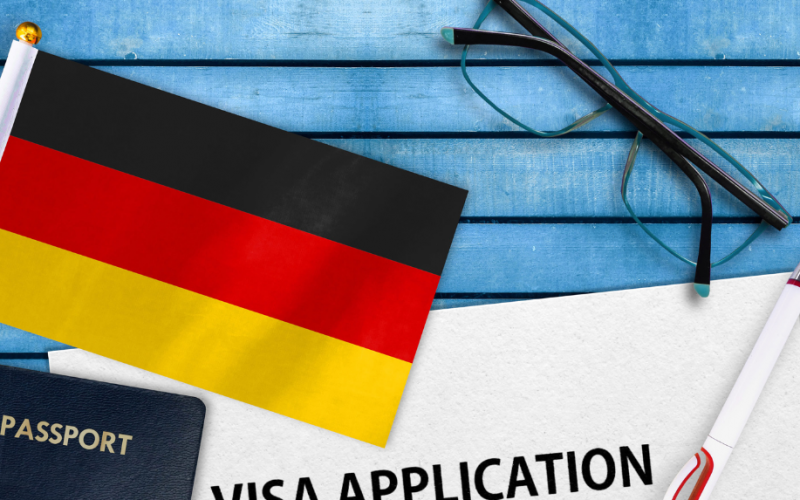Getting a German student visa to study in Germany is the key to getting a high-quality education in a country popular with students worldwide. Germany has great universities, a diverse culture, and a high standard of living.
As a Nigerian student, applying for a student visa to study in Germany might seem difficult. But with the right information, it’s possible. To have a successful application, you need to be well-organized and understand what’s expected from you.
In this article, we’ll explain the process step-by-step and give you all the information you need to successfully apply for a Germany student visa.
Table of contents
- Is Germany student visa hard to get?
- What is the success rate of Germany student visa in Nigeria?
- What are the requirements for a student visa in Germany?
- How to get German student visa
- How long does it take to get a German student visa in Nigeria?
- How much is a Germany student visa from Nigeria?
- Can I convert my student visa to work visa in Germany?
- FAQs
- Conclusion
- References
- Recommendations
Is Germany student visa hard to get?
From the research done in 2023, we can say that it is relatively easy for students to get a German student visa.
Getting a student visa in Germany is not very hard if you meet all the requirements. To get the visa, you must ensure you have all the necessary documents and fit the eligibility criteria.
Applying for a German student visa can be a bit complex, but if you follow the instructions carefully, you can succeed. Just be prepared to gather and submit all the required documents and prove that you are eligible to study in Germany.
Read: Switching From an F-1 Visa to a Green Card
What is the success rate of Germany student visa in Nigeria?
According to research done recently by mygermanuniversity.com, it is quite easy for Nigerian students to get a Germany student visa. Out of every 100 students who apply for the visa, about 95 are approved while only 5 are rejected.
This means that if you apply for a Germany student visa as a Nigerian student, you have a high chance of getting it.
This can be encouraging for Nigerian students who want to study in Germany. As long as you meet the requirements, follow the application process carefully, and gather all the necessary documents, there’s a good chance you will get the visa.
What are the requirements for a student visa in Germany?
To get a student visa for Germany, you must provide certain documents and meet certain requirements. These include:
Proof you’re a student:
- Two completed national visa application forms: You’ll need to fill out these official forms with your information.
- Proof of admission at a German education institution: This could be one of the following:
- University admission letter “Zulassungsbescheinigung” – This is your official acceptance letter from the university.
- Letter of admission in a foundation course issued by a Studienkolleg – This is for programs requiring extra preparation.
- Letter of admission in the propaedeutic course is for a preparatory academic program.
- Letter of admission in a preparatory German language course is for programs requiring extra language training.
Your language skills:
- Proof of German language proficiency (for German-only and mixed-language study programs): You’ll need to pass a test like the German Language University Entrance Examination for International Applicants (DSH), Test of German as a Foreign Language (TestDaF), Goethe Institute German Language Diploma (GDS), or German Language Diploma of the Standing Conference of the Ministers of Education and Cultural Affairs, Level II (DSD).
- Proof of English language proficiency (for English and mixed-language study programs): You’ll need to pass a test like the Test of English as a Foreign Language (TOEFL) with a score of 550 (paper-based test), 213 (computer-based test), or 79-80 (internet-based test), or the International English Language Testing System (IELTS) with a score of 5 to 6.5. If you’re asking, “Is IELTS required for Germany student visa?”, then you have your answer!
Your educational background:
- Authenticated certificates of earlier education: These are your official transcripts from your previous schools.
- German university entrance qualification “Abitur” (if you studied in a German education provider abroad): You can include this if you already have a German high school diploma.
- Recognized foreign academic qualification (if not): If you haven’t studied in Germany before, this official document shows your qualifications are equal to a German high school diploma.
- Academic records or transcripts are like report cards from your previous studies.
- Curriculum vitae: Your resume lists your education and work experience.
Proof of financial support:
- Means of subsistence “Finanzieruungsnachweis” shows you have enough money to cover your living expenses in Germany. You can provide one of the following:
- Blocked bank account: This is a special savings account in Germany with a set amount of money you can only access a certain amount each month.
- Letter of commitment by a resident “Verpflichtungserklärung”: A person living in Germany can write a letter promising to cover your living costs.
- Letter of declaration by a parent: Your parent can write a letter promising to support you financially, along with their bank statements for the past 6 months.
- Scholarship awarding certificate: This shows you have a scholarship to help cover your costs.
Health and Insurance:
- Student health insurance: You’ll need health coverage for your stay in Germany, with a minimum coverage of 30,000 EUR and a validity period of at least three months.
Other essentials:
- Valid national passport: This is your official ID for traveling.
- Two recently taken biometric portrait photographs: Make sure they follow specific guidelines for size and background.
- Motivational letter: Briefly explain why you chose this program and how it fits your future goals.
- Proof of having paid the German student visa application fee: You must pay a small fee to process your visa application.
Optional documents:
- Marriage certificate and child’s birth certificate (if applicable): If you’re married with kids, you can include these documents.
Also, read: 7 Common Requirements for Scholarships: All You Need to Know
How to get German student visa
To get a German student visa from Nigeria, you will need to follow these steps:
1. Get Accepted to a German Program
This is the first and most important step! You’ll need an acceptance letter from a German university or language program. This letter proves you have a place to study and shows the German government you’re a serious student.
If you haven’t gotten accepted yet, you can apply for a “student applicant visa” while you wait for a response. Just make sure you have proof you submitted your program application.
2. Find the Right German Embassy/Consulate
There are a few German diplomatic missions in Nigeria that handle student visas. Find the closest one – it’ll save you travel time later!
3. Schedule a Visa Appointment
It’s appointment time once you’ve found the right embassy/consulate! Remember, you can’t submit your application without one. Be prepared to wait a few weeks, depending on their busy schedule.
4. Gather Your Documents
This might seem like the biggest task in this process, but we’ll break it down! Here’s a list of documents you’ll likely need (it can vary slightly, so always double-check with the embassy/consulate):
- Valid passport: This is your official ID for traveling.
- Completed visa application forms: Fill these out carefully and completely.
- Proof of acceptance: This is your acceptance letter from the German program.
- Educational background: This includes transcripts from previous schools and any diplomas or certificates you’ve earned.
- Proof of financial support: This shows you have enough money to cover your living expenses in Germany. You can use a blocked bank account in Germany, a letter of commitment from someone in Germany who will support you financially, a letter from a parent promising financial support with their bank statements, or a scholarship award certificate.
- Language test results (if needed): Depending on your program, you might need to pass a test (like TOEFL or DSH) that shows you can understand your classes in German or English.
- Passport photos: Ensure they follow the specific guidelines (size, background, etc.).
- Health insurance: You’ll need health coverage for your entire stay in Germany.
- Motivational letter: Briefly explain why you chose this program and how it fits your future goals.
- Visa application fee: A small fee is charged for processing your visa application. (You might pay this at the appointment.)
- Optional: Marriage certificate and child’s birth certificate (if applicable).
5. Submit Your Application and Attend Your Appointment
Head to the embassy/consulate with all your documents on your appointment day. You might also need to give your fingerprints and attend a short interview.
6. Wait for a Decision
The embassy/consulate will review your application and might take up to 6 weeks to give you an answer. If everything looks good, you’ll get your visa and can finally start your studies in Germany! If your visa gets rejected, they’ll explain why and what you can do next.pen_spark
How long does it take to get a German student visa in Nigeria?
According to the information on nigeria.deplo.de, the time it takes to get a Germany student visa in Nigeria can vary, but it usually takes 4 to 12 weeks. The exact processing time depends on the workload of the local German embassy or consulate where you apply.
Typically, the German student visa processing time for Nigerian students is about 2 to 3 months. However, this can vary depending on your case, so it’s always a good idea to start the application process as early as possible to avoid delays.
The embassy or consulate may take this amount of time to review your documents, check your eligibility, and decide on your visa application.
How much is a Germany student visa from Nigeria?
The cost of a Germany student visa for Nigerian students is 75€. This is the same for all students aged 18 and above, while students under 18 pay half the cost, or 37.5€.
The visa fee must be paid in the local currency, which is NGN in Nigeria. The payment method will depend on the local embassy or consulate. For example, in some countries, you may need to pay with cash, a credit card, or a demand draft.
Also, see: 21 Best Countries to Study MBA Abroad
Can I convert my student visa to work visa in Germany?
If you’re asking, “Can I work with student visa in Germany?” The answer is yes! And also, yes, you can convert your student visa to a work visa in Germany. If you have finished your studies and found a qualified job in Germany, you can apply to change your residence permit from a student visa to a residence permit for skilled workers or an EU Blue Card.
This means that after you finish your studies, you can look for a skilled job in your field of study. Once you have found one, you can apply to change your visa from a student visa to a work visa, which allows you to live and work in Germany.
FAQs
International students with a German student visa can work while studying. They can work up to 140 full days or 280 half-days per year without requiring permission from the Federal Employment Agency.
Yes, after applying for the German study visa, students will need to give an interview, which will significantly impact their application. Students should spend much time preparing for this interview to increase their chances of acceptance.
To avoid rejection, you should make sure to:
Submit all required documents on time and in the correct format
Prepare thoroughly for your visa interview
Apply early for your visa
Demonstrate your language skills
Italy
Denmark
Czech Republic
France
Belgium
Austria
Liechtenstein
Switzerland
Norway
Poland
Netherlands
Lithuania
Luxembourg
Estonia
Slovakia
Malta
Hungary
Sweden
Portugal
Latvia
Slovenia
Finland
Germany
Greece
Spain
Iceland
Yes, you must show proof of English proficiency. The IELTS test is an accepted method to demonstrate your English language skills. You must score at least a band score of 5.5 to 6.0 on the IELTS test to meet the German student visa requirements.
Conclusion
International students from Nigeria can apply for a German student visa by following the steps mentioned in this guide. The main thing is to ensure you meet all the requirements, like having a valid passport, proof of admission to a German university, and enough money to support yourself.
To ensure your application goes smoothly, ensure you have all the documents you need and that you’re ready for the interview. The application process can take a while, so start as early as possible to avoid delays. With good planning and careful preparation, you can get your Germany student visa and begin an exciting and fulfilling academic journey.
References
- mygermanuniversity.com – Germany Student Visa Processing Time
- german-visa.org – Germany Student Visa from Nigeria
- german-visa.org – How to Get a German Student Visa





